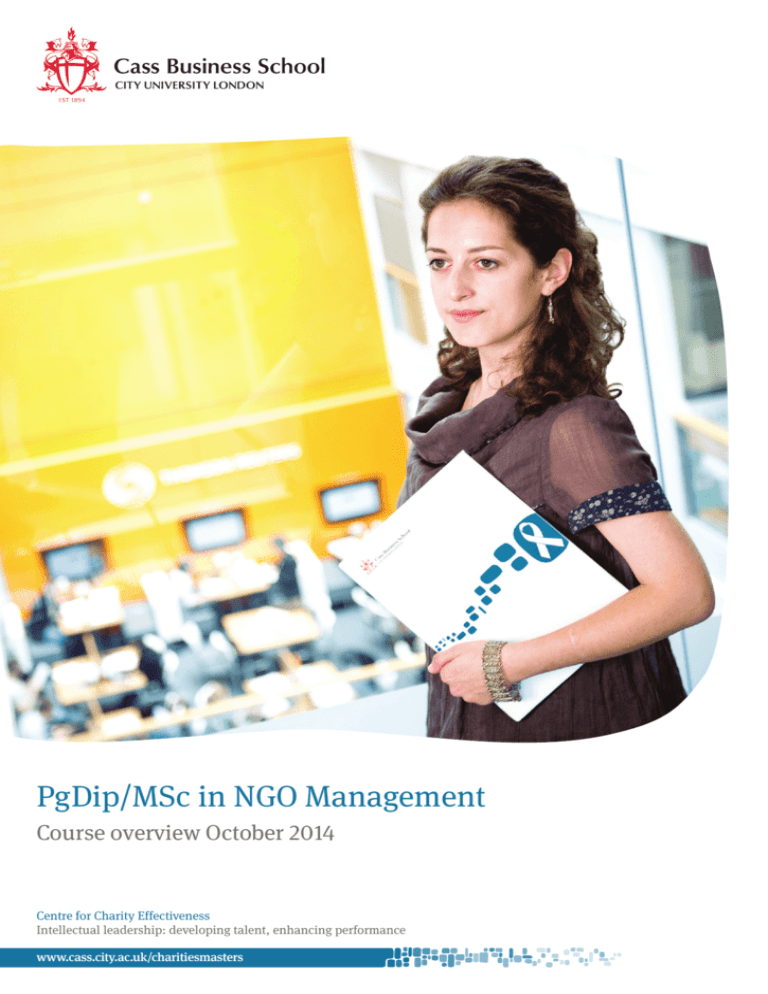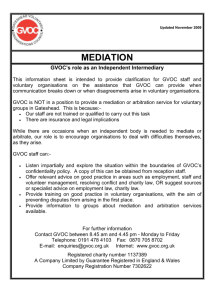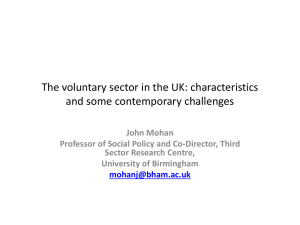PgDip/MSc in NGO Management
advertisement

PgDip/MSc in NGO Management Course overview October 2014 Centre for Charity Effectiveness Intellectual leadership: developing talent, enhancing performance www.cass.city.ac.uk/charitiesmasters The Centre for Charity Effectiveness Excellent leadership and management are the lifeblood of any successful organisation. The huge sums invested every year by both private and public organisations in improving the leadership and management skills of senior staff are universally recognised as vital to this success. The Centre for Charity Effectiveness believes it is equally essential to invest in the leaders, managers and other professionals working in the voluntary and community sector (VCS) to create a sustainable future. To meet this need the Centre for Charity Effectiveness was established and is part of City University’s Cass Business School, one of the top rated business schools in Europe. It is the only centre of excellence which offers the full range of latest research, education, training, mentoring and consultancy for voluntary and community sector employees and volunteer leaders. Course Objective The overall aim of the Programme is to enable students to develop the management competencies and analytical capabilities needed by those in leadership and management positions in international NGOs. Our Students All students will be highly motivated graduate-level people who bring a wide range of professional competence, skills and experience from a wide range of charitable and beyond profit organisations. In general we ask for a good first degree, normally a 2.1 Honours degree from a British University or an equivalent qualification from a leading overseas institution and three plus years relevant experience at a senior level in a charity or beyond profit organisation. Course Structure The Postgraduate Diploma is offered on a part time basis and is taught over a period of 12 months. The Diploma consists of 5 core modules, common to all Centre for Charity Effectiveness postgraduate courses which provide the essential underpinning of management skills, plus three specialist pathway modules. All courses are taught at Cass Business School and will require attendance one weekend a month commencing on the Friday afternoon at 13.00 to 21.00 and finishing on Saturday at 18.00. Additional times of attendance will be required: • On the Induction Day (the Friday of the October weekend of the course) • For Action Learning Set meeting (usually alternate months, on Friday morning of the teaching weekend) • The Resource Management module exam. Upon successful completion of the diploma students will be given the option to continue to the MSc. This requires students to take the module in Research Methods for Managers. They may then elect to conduct six months of personal supervised research and the presentation of a 15,000 word dissertation. Alternatively they may choose to attend the three Specialist Pathway modules of one of the other courses as a Taught Masters. Students opting to complete the Taught Masters now have the choice to complete the newly introduced Social Enterprise module rather than a second Shadowing/Fieldwork Exercise module as part of their specialist module selection. Course Content Core Modules Introduction to Learning This module aims to enable the student to: • Map out their learning and development needs for the forthcoming 12-24 months • Set these needs within the context of the Masters (or Diploma) Programme • Learn new learning and study skills. Syllabus • The Theory of Learning • Assessing your learning style • Learning and polishing study skills • Making use of all the available tools • Drawing up a Learning Contract. Voluntary Sector Policy This module aims to enable the student to: • Develop an informed and critical understanding of the public policy environments in which voluntary organisations operate, to which they variously respond or help shape. Syllabus • Policy concepts and the contested nature of public policy • Developments in new public management and public policy trends – marketisation, modernisation, joint working, partnerships • Fissures, links and building blocks in public policy networks in and for voluntary organisations • Policy actors in governmental and voluntary organisations and models of governmental / voluntary sector relations in UK and international contexts • Structuring and restructuring policy problems; new and enduring responses (e.g. faith based provisions, cross sectoral working) • Reputational impact on policy advocacy; the impact of mergers, alliances, closures and scandal on organisations’ policy roles • Policy outcomes – the voluntary sector as provider, evaluator and critics • Lesson drawing in public policy and forecasting public policy futures; the voluntary sector as provider of policy evidence, policy learner and policy leader and advocate • Sectoral policy contributions to the development of civil society. Marketing and Fundraising The aims of the module are: • To provide students with the concepts, underpinning knowledge, skills and techniques to plan and develop marketing and operations systems. • To enable students to analyse marketing needs, evaluate marketing plans, in the context of applying marketing concepts to their own organisation. Syllabus • Effective Marketing Information Systems • Development of a marketing strategy • Product/Service policy and new product development • Role of Communications • Branding • Pricing as a value-added marketing tool • Capacity planning – resources planning and allocation • Total Quality Management • Stakeholder/Customer care. Resource Management This module aims to: • Provide students with an understanding of the principles of resource management within the specialist context of charities. Syllabus • Definitions and the legal framework of charities and voluntary organisations • The role of the Charity Commission • Sources of finance for the charity sector • Introduction to general accounting principles • Charity accounts and regulatory framework • Understanding, interpreting and analysing charity accounting statements • Costing and budgeting in voluntary organisations • Risk assessment • Outsourcing • Appraising, appointing and dismissing auditors and other resource consultants and experts • IT Strategic appraisal and implementation • The nature of Human Resource Management • Human resource and personnel issues including training and development, reward and retention and effective selection and recruitment. Strategy, Diversity and Governance The aims of the module are: • To develop a broad knowledge and conceptual base in the field of strategy development, diversity and governance • Introduce practical tools to help improve the quality of an organisation’s strategic response to the changing environment • Introduce practical tools to help improve the ability of the organisation and its managers and leaders to build a diverse workforce • Provide an enhanced appreciation of the constraints and opportunities offered by the changing governance and service-delivery frameworks which affect voluntary organisations. Syllabus Improving an organisation’s strategic response by use of strategy and diversity management and theory: • Approaches to developing strategy • Approaches to managing diversity • The changing environment of the voluntary sector • Case studies on the application of strategic planning and diversity • Governance issues in voluntary organisations • Regulation of the charitable sector. Specialist Subject Modules NGO Management: The Strategic Issues This module aims to enable the student to: • Understand the key strategic issues facing the NGO sector • Analyse the organisational challenges facing international NGOs. Syllabus • The development environment and strategic trends • NGOs: organisational types and structures • The issues of managing NGOs in the current aid architecture • Implications of the changing role of INGOs and civil society • Applying NGO principles and values • Governance and working with NGO Boards • NGO Capacity building: trends and effectiveness • Developing strategies and strategic plans • Building partnerships and managing inter-organisational relations. Shadowing This module aims to enable the student to have the opportunity to spend 4-5 days shadowing a senior NGO manager or undertaking a relevant fieldwork consultancy exercise with members of an NGO’s senior management team. These may include the opportunity to gain international experience by shadowing a senior staff member on an international assignment or working with the leadership team of an overseas partner. This will enable students to gain international exposure and cross-cultural perspectives on the way senior managers work and how decisions are made. • Develop their perspective on the role and practice of senior NGO managers • Allow students to consider the ethical and environmental issues face by senior managers • Study at close hand the way change is managed at a senior level • Analyse alternative approaches to improving their own and their organisation’s effectiveness. Syllabus • Design of Shadowing Proposal linked to Learning Contract and negotiation with senior manager of shadowed organisation (approved by the Academic Leader) • 4-5 days shadowing senior manager or fieldwork consultancy exercise – observing and learning from them • Reflections using all the theories and models learnt on the programme preparation of reflective report containing analysis and reflections. Managing NGOs: People and Practice This module aims to enable the student to: • Critically appreciate the issues NGO managers face • Develop the skills and competencies to work effectively with different people and the processes and practices involved. Syllabus • Managing effective, accountable and sustainable NGOs • NGO Leaders and Leadership Development • NGO management competencies • Dimensions of cross-cultural management in NGO context • Managing People & Teams in NGOs • OD and organisational change in NGOs • Promoting organisational learning and innovation in NGOs • Current issues in monitoring & evaluation. Term Dates Diploma Modules Induction/Introduction to Learning 03 October 2014* Voluntary Sector Policy 04 October 2014 07 – 08 November 2014 Marketing and Fundraising 12 – 13 December 2014 Resource Management 09 – 10 January 2015 06 – 07 February 2015 06 – 07 March 2015 NGO Management: The Strategic Issues 17 – 18 April 2015 29 May 2015 Managing NGOs: People and Practices 30 May 2015 26 – 27 June 2015 Shadowing to be completed by August 2015 Strategy, Diversity and Governance 24 – 25 July 2015 04 – 05 September 2015 Examination Dates Resource Management Friday 10 April 2015 14.00 to 17.00 Teaching normally takes place between 13.00 and 21.00 on Friday, and 09.15 to 17.30 on Saturday. The following denote exceptions: *all day (09.00 to 19.00) An Action Learning Set session will take place on the Friday morning of each alternate teaching module. Masters (conversion) Masters by Dissertation (Dates tbc) Research Methods for Managers 22 – 23 January 2016 19 – 20 February 2016 Dissertation due 15 September 2016 Taught Masters Research Methods for Managers 22 – 23 January 2016 19 – 20 February 2016 All Specialist Pathway modules of one of the other courses: Adv. Charity Accounting, Audit and Taxation** 15 – 16 April 2016 13 May 2016 Voluntary Sector Financial Management 14 May 2016 17 – 18 June 2016 Fieldwork exercise*** to be comleted by August 2016 Or Fundraising** 15 – 16 April 2016 13 May 2016 Strategic Charity Marketing 14 May 2016 17 – 18 June 2016 Fieldwork exercise *** to be completed by August 2016 Or Principles and Practices of Grantmaking** 15 – 16 April 2016 13 May 2016 Management of Grantmaking 14 May 2016 17 – 18 June 2016 Fieldwork exercise*** to be completed by August 2016 Or Organisation, Leadership and Change 15 – 16 April 2016 20 May 2016 Managing People and Quality 21 May 2016 17 – 18 June 2016 Shadowing*** to be completed by August 2016 Examination Dates Applies to Modules marked with ** only 10 June 2016 (14.00 to 17.00) Teaching normally takes place between 13.00 and 21.00 on Friday, and 09.15 to 17.30 on Saturday. *** Alternative module option Social Enterprise 22 – 23 July 2016 09 – 10 September 2016 The faculty The faculty represents a combination of leading academics and practitioners. Stephen Bubb is Chief Executive of the Association of Chief Executives of Voluntary Organisations (ACEVO). Involved in leadership and sector funding which has radically shifted attitudes and policies. Currently leading the establishment of a Third Sector Leadership Centre, and a member of The Sunday Times / YouGov Think Tank. Professor Ian Bruce CBE is a Visiting Professor and his particular interest is strategic planning and marketing for charities. He is Vice President of the Royal National Institute of the Blind and was previously Chief Executive of two national charities, a Chief Officer in local government and manager in the private sector. Professor David Clark is a Chartered Accountant acting as an independent consultant to charities. From 1987 to 2005 he was a member of the Charities and Not-for-Profit Unit of haysmacintyre and predecessor firms, the last 15 years as an audit partner. He continues to act as a Consultant to haysmacintyre and is a Visiting Professor at Cass Business School. He is actively involved in advising a wide range of charity sector clients on their financial management and has developed a specialisation in religious charities, especially Roman Catholic Dioceses and Religious Orders. Caroline Copeman is a Senior Visiting Fellow. She has 20 years senior experience in the commercial, public and voluntary sectors and has particular knowledge of strategy development and business planning, human resource management, change management, leadership and organisational development. Professor Stuart Etherington is Chief Executive of NCVO. Throughout his career he has been involved in the leadership of voluntary organisations and policies surrounding them. As such he has become a leading commentator, both through his writing and his media profile. Dr Peter Grant is Senior Teaching Fellow in the Faculty of Management and the academic leader on the MSc Grantmaking, Philanthropy and Social Investment programme. Peter worked in the Arts and then as Director of an inner city charity for eight years. He joined Sport England at the inception of the National Lottery where he was respectively Deputy Director of Operations and then Head of Public Affairs and Development. From 1999 to 2004 he was Director of Operations of the New Opportunities Fund. Professor John Hailey is a Senior Teaching Fellow at Cass Business School and the academic leader on the MSc NGO Management. He is also an independent consultant. Formerly, he was Professor of International Management and Deputy Director of Oxford Brookes University Business School, Director of the International Development Centre at Cranfield School of Management, and a Research Fellow at the East West Center in Hawaii. He was also one of the founders of the Oxford-based International NGO Training and Research Centre (INTRAC), and was the first Director of INTRAC’s Praxis Programme which was established to inform the development of new approaches to capacity building and managing change. Professor Jenny Harrow, Professor of Voluntary Sector Management in the Centre for Charity Effectiveness, has extensive academic and practitioner experience in the voluntary sector. She is the Co-director of the ESRC Centre for Charitable Giving and Philanthropy and is a collaborative researcher, with research clients including Communities Scotland, the Community Fund, the Joseph Rowntree Foundation and the NCVO. She has a strong track record in doctoral supervision and is an active trustee in the fields of disability and community action. Professor Andrew Hind is a Visiting Professor in Charity Governance and Finance. He is the joint module leader for Resource Management and Voluntary Sector Financial Management with Professor Paul Palmer. He was previously the Chief Executive of the Charity Commission and currently Editor of the Charity Finance Magazine. Professor Stephen Lee is Academic Leader for the PgDip/MSc Charity Marketing and Fundraising programme. He is an active researcher and leading commentator on strategy development, marketing, fundraising, ethics and non-profit governance issues. He entered the voluntary sector in 1982 as Deputy Chief Executive at the Charities Advisory Trust and Directory of Social Change. Following further senior appointments in the not-for-profit sector, he held the post of Director of the Institute of Fundraising (IOF) for a period of eleven years. Professor Paul Palmer is the Associate Dean for Ethics, Sustainability and Community Engagement at Cass Business School as well as the Centre’s Course Director for the specialist charity Masters programmes. As the author of several books on charity finance and governance, he also contributes to NCVO’s web-based helpline and is a member of the Charity Commission’s SORP committee. Previously he worked in senior positions in the voluntary sector. Atul Patel is a Senior Teaching Fellow and the academic leader on the MSc Voluntary Sector Management. Qualified in social work, he has spent more than 15 years working in the voluntary and statutory sectors. His particular interests are in management development, strategy development, diversity development, assessment of complex staffing situations and advising trustees. Ray Jones is Head of Accountancy Policy at the Charity Commission and is module leader for one of the specialist pathway modules on the Charity Accounting and Financial Management course. Current and past contributors and guest lecturers include: PgDip/MSc Charity Accounting and Financial Management Tony Austin Tax Partner, Mazars, London Region Kevin Barnes Finance Director, Barnados Don Bawtree Partner and Head of Charity Unit, BDO Stoy Hayward Paul Breckell Finance Director, RNID James Brook-Turner Finance Director, Nuffield Foundation Geoff Burnand Social Finance Jim Clifford Partner, Baker Tilly Greyham Dawes Director, Charities Unit, Horwath Clark Whitehill Kenneth Dibble Head of the Legal Division, Charity Commission Graham Elliott VAT Partner, Withers Neil Finlayson Charities Partner, Kingston Smith Chartered Accountants Pesh Framjee Partner, Horwath Clark Whitehill, Charity Unit Peter Gotham Chair of Charities Special Interest Group, ICAEW Bob HumphreysOxfam Robert Meakin Partner, Stone King Solicitors Paul Mitchell Newton Investment Management Russell Moore Charity VAT consultant, Saffrey Champness Rick Payne ICAEW Finance Innovation Lab Andrew Pitt Head of Charities, Newton Investment Management Adrian Poffley World Bank David Rowe Head of Charities Unit, UBS Mark Salway Finance Director, CARE International Kate Sayer Partner, Sayer Vincent Alan Sharpe Finance Director, RSPB; Chairman, Charities Consortium Julian Smith Partner, Farrer and Co John Tate IT Advisor (Charity Finance Group, Charity Technology Trust) Andrew Wauchope Head of Charities, UBS PgDip/MSc Charity Marketing and Fundraising Mark Astarita Ken Burnett Jane Cunningham Fiona Hesselden Giles Pegram Richard Radcliffe Chair IOF & Director of Fundraising British Red Cross Fundraising Forum CEO Personal Telephone Fundraising Consultant at UNHCR International Consultant Chairman, Legacy Campaign Development, Smee & Ford PgDip/MSc Grantmaking, Philanthropy and Social Investment Steven Burkeman David Carpenter Christine Elliott Margo Horsley Julia Kaufmann Professor Diana Leat Sarah Mistry Gerald Oppenheim Cathy Pharoah Nigel Siederer Clare Thomas MBE Anthony Tomei Beth Breeze Chief Executive, Board Member and Volunteer in not-for-profit sector Director Trioplus Consultants and former Director, Lottery Sports Fund Chief Executive, Ramblers Association Consultant and Trainer for trusts, foundations, Lottery distributors and charities Freelance evaluator, trainer and capacity builder Visiting Professor, Cass Business School Head of Research, Big Lottery Fund Director of Planning and Performance, Big Lottery Fund Former Head of Research, Charities Aid Foundation Runs Good Foundations Consultancy Chief Grants Officer, Bridge House Trust Director, Nuffield Foundation Freelance researcher and writer specialising in philanthropy and charitable giving PgDip/MSc NGO Management Christine Allen Neil Casey Chris Cattaway James Crowley Corinne Davey Ben Emmens Anna Feuchtwang Anne Garbutt Alex Jacobs Ben Jackson Rick James David Lewis Rachel Manton Peter Moore Christie Peacock Nick Roseveare Director progressio Chair, People in Aid Independent Consultant, pm4ngo & Global Achievements Accenture Development Partnership Director, CDDC Director of Human Resource Services, People in Aid Director, Every Child Consultancies Director, INTRAC Director of Quality, PLAN International Director, BOND Senior Consultant, INTRAC Professor of Social Policy, LSE Accenture Development Partnership Action Aid, International Board CEO, Farm Africa Director, BOND PgDip/MSc Voluntary Sector Management Debra Allcock-Tyler Andrew Baines Fiona Bartels-Ellis Kate Bowgett Dorit Braun Simon Davey Paul Hemming Veronique Jochum Susan Kay-Williams Nigel Lewis Bharat Mehta Tony Newby Louise Savell Valerie Tulloch Sally Warren Karl Wilding Chief Executive, Directory of Social Change Royal British Legion Head, Equal Opportunity and Diversity, British Council Volunteer Management Advisor, London Museums Hub Parentline Plus Omega Alpha Ltd Southern Region Childline NCVO Garden Organic Chief Executive, Ability Net Chief Executive, City Parochial BTCV ARK NCH Generate Director of Public Policy, NCVO Course Fees The fees for the programme are: Postgraduate Diploma£5,850 MSc Conversion £3,150 Fees can be paid in two instalments. The first has to be paid to complete registration. If sponsored, the sponsoring charity will be invoiced around the start date of the course. If paying in instalments the second one is due in the first week in April 2015. Any deposit paid to secure your place will be deducted from the first instalment. For those converting the diploma to MSc the fee of £3,150 is payable as a single payment in the second year. For any further enquiries, please contact the Charity Programmes Office charityapps@city.ac.uk Centre for Charity Effectiveness Cass Business School 106 Bunhill Row London EC1Y 8TZ T: +44 (0)20 7040 5114 E: charityapps@city.ac.uk www.cass.city.ac.uk/charitiesmasters Cass Business School In 2002, City University’s Business School was renamed Sir John Cass Business School following a generous donation towards the development of its new building in Bunhill Row. The School’s name is usually abbreviated to Cass Business School. Sir John Cass’s Foundation Sir John Cass’s Foundation has supported education in London since the 18th century and takes its name from its founder, Sir John Cass, who established a school in Aldgate in 1710. Born in the City of London in 1661, Sir John served as an MP for the City and was knighted in 1713.






